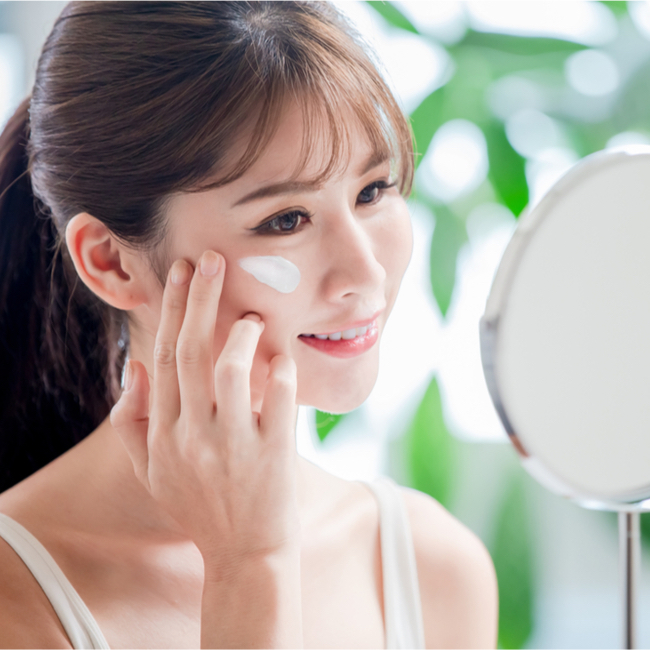
1. Sunscreen & SPF
Whether you apply it on its own or within a morning moisturizer with SPF, sunscreen is a vital and essential part of an effective anti-aging skincare routine. “Sunscreen is the number one anti-aging ingredient on the market,” Zeichner explains. He notes that “studies have shown that after a year of sunscreen use but no other anti aging-ingredients provides improvements in all signs of skin aging.” This includes pigmentation, texture, and wrinkles.
He advises to look for a broad spectrum sunscreen with at least SPF 30. “Even incidental UV light exposure adds up over a lifetime, so daily sunscreen is important, not just when you are at the beach,” Zeichner adds, saying that sun damage leads to wrinkled skin and a drier look overall. Your skin needs moisture to maintain a healthy glow!
2. Vitamin C
Often found in serums, moisturizers and cleansers, this essential vitamin can do wonders for aging skin, and as these experts note, it can greatly reduce the appearance of wrinkles. “Vitamin C is a potent antioxidant that blocks production of abnormal pigmentation, neutralizes free radical damage from the sun and acts as a cofactor for new collagen production,” Zeichner says.
A notable helpful effect of vitamin C usage in skincare products is its ability to brighten your skin tone and aid sun-damaged skin with moisture. “A moisturizer acts like a drink of water for your face,” says Factor, noting that moisturizers “containing vitamin C” as an ingredient “help to nourish and hydrate” the skin. “This is especially important as you get older and your skin becomes drier, which makes it more prone to wrinkles,” she says.
3. Hyaluronic Acid
While many people use vitamin C serums along with moisturizer in their morning routines, a popular anti-aging nighttime pairing is hyaluronic acid and moisturizer before bed. Hyaluronic acid (also known as hyaluronan) iis naturally produced by your body, but its levels (like many skin-moisturizing functions) lessen with age.
The best way to combat this and utilize it for more supple skin, experts say, is to find a serum, supplement or other way to add hyaluronic acid to your routine. “Research shows that using a moisturizer that contains hyaluronic acid is especially effective at preventing wrinkles from forming or getting deeper,” says Factor.
4. Retinol
Ah, retinol. It’s the product ingredient you’ve undeniably heard so much about— from people raving about its anti-aging benefits to others complaining about its harsh side effects. Either way, its pros often outweigh the cons when it comes to smoothing out wrinkles and fine lines, but it ultimately depends on what treatments your skin type can handle.
“Retinol is perhaps the best studied ingredient to treat wrinkles,” Zeichner says. “It helps stimulate production of collagen to support the foundation of the skin, fill in wrinkles you already have, and prevent the development of new wrinkles.” He says to be careful “because it can cause irritation in the first few weeks, so start using it every other night as your skin adjusts.”
Factor agrees, noting that retinoids, which are derived from vitamin A, are one of the most studied anti-aging ingredients. “Sometimes referred to as retinol, retinoids have the ability to increase collagen production, which helps plumps up the skin,” she explains. Retinoids also encourage skin regeneration and can promote the creation of new blood vessels, which may help improve the skin’s overall appearance and texture. “There are five main types of retinoids, each with slightly different degrees of potency,” Factor continues. “Some are available in creams and gels that you can buy over the counter, while others are available by prescription only.”
Dermatologists often recommend starting with a small amount to test your skin’s tolerance to the product, and using it every other day to avoid peeling. Both Zeichner and Factor say to talk to your dermatologist to find out which option is right for your skin!
Overall, wrinkles are an inevitable part of aging, but there are steps, Factor says, you can take to slow their progress and prevent new ones from forming: “Lifestyle factors like eating a vitamin-rich diet, drinking plenty of water, protecting your skin from the sun, not smoking, and managing your stress play a key role when it comes to keeping your skin healthy and youthful.” Additionally, using a retinoid and a moisturizer that contains hyaluronic acid and vitamin C can also be effective at preventing the onset of wrinkles. If you have questions or concerns about products that may help prevent wrinkles, be sure to follow-up with your doctor or dermatologist.


